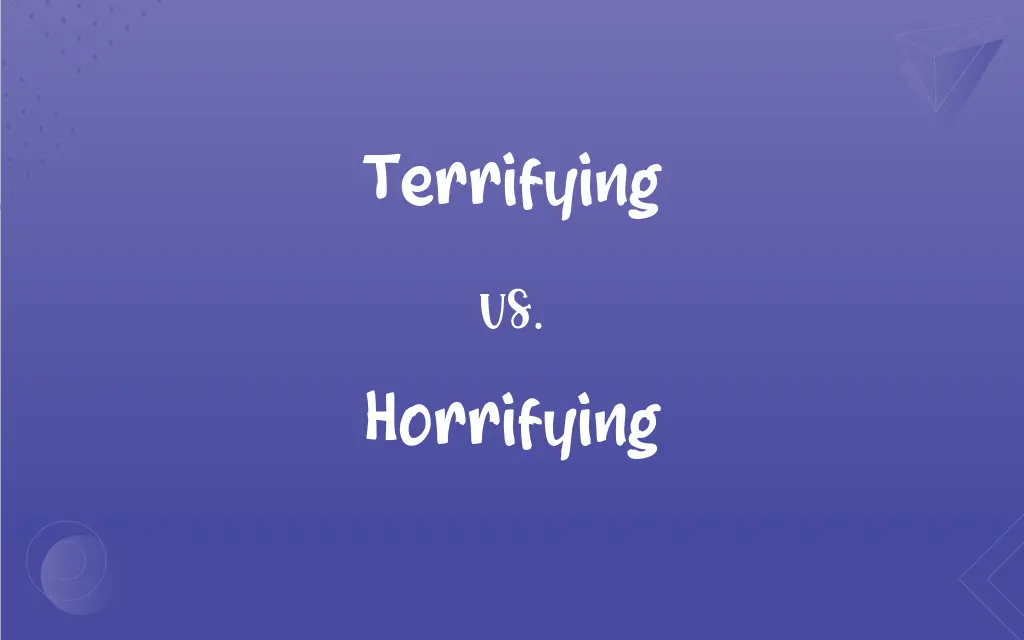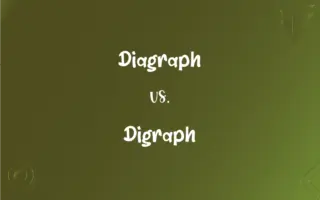Terrifying vs. Horrifying: What's the Difference?
Edited by Aimie Carlson || By Janet White || Updated on November 18, 2023
Terrifying evokes intense fear or terror, often related to immediate or impending danger, while horrifying implies shock or disgust, usually due to witnessing something appalling or repulsive.

Key Differences
Terrifying describes a feeling of extreme fear, often associated with immediate threats or danger, eliciting a strong emotional and physical response. Horrifying, on the other hand, involves a reaction of horror, typically stemming from shock or repulsion at something gruesome or morally repugnant.
A terrifying experience is one that instills a sense of panic or dread, often related to personal safety or existential threats. Horrifying experiences tend to evoke disgust or shock, arising from witnessing something deeply unsettling or morally disturbing.
The term terrifying is often used in contexts of danger, thrill, or suspense, such as in horror movies or intense situations. Horrifying is used to describe reactions to events or scenes that are shockingly offensive, gruesome, or morally abhorrent.
While both terrifying and horrifying can describe intense negative experiences, terrifying often implies a direct impact on one's sense of security or survival. In contrast, horrifying may not directly threaten the individual but invokes a strong sense of revulsion or indignation.
Terrifying situations are those where the fear is predominant, causing alarm or dread. Horrifying situations, while they can be fearful, are primarily characterized by their capacity to shock or cause revulsion due to their nature or implications.
ADVERTISEMENT
Comparison Chart
Primary Emotion
Intense fear or terror
Shock or disgust
Context
Immediate threats, danger
Witnessing appalling or repulsive events
Physical Response
Panic, dread, heightened alertness
Shock, revulsion, moral indignation
Typical Usage
Horror movies, suspenseful situations
Gruesome, morally disturbing scenarios
Impact on Viewer
Direct sense of danger
Revulsion or shock, not necessarily direct danger
ADVERTISEMENT
Terrifying and Horrifying Definitions
Terrifying
Extremely frightening or intimidating.
The haunted house was terrifying to the visitors.
Horrifying
Extremely disturbing or repulsive.
The details of the accident were horrifying.
Terrifying
Capable of instilling a deep sense of dread.
The thought of being lost in the wilderness is terrifying.
Horrifying
Causing horror, shock, or disgust.
The crime scene was horrifying to behold.
Terrifying
Associated with immediate or impending danger.
The sound of footsteps in the dark alley was terrifying.
Horrifying
Evoking a strong reaction of revulsion or horror.
The documentary about the war was horrifying.
Terrifying
Eliciting a strong emotional response of terror.
The news of the earthquake was terrifying.
Horrifying
Related to witnessing something appalling.
The condition of the neglected animals was horrifying.
Terrifying
Causing extreme fear.
The terrifying storm left everyone in panic.
Horrifying
Often associated with moral repugnance or shock.
The revelation of the scandal was horrifying.
Terrifying
To fill with terror; make deeply afraid
"She was terrified that he would lie to her" (Jodi Picoult).
Horrifying
To cause to feel horror
The citizens were horrified by the bombings. The guest was horrified at the rudeness of what he had said.
Terrifying
To drive or force by arousing fear
"The few who survived had long ago been terrified into complete intellectual surrender" (George Orwell).
Horrifying
To cause unpleasant surprise to; shock
"I ... passed a mirror ... &.
Was horrified at the shabbiness of my hat" (Margaret Suckley).
Terrifying
Frightening or intimidating.
Horrifying
Present participle of horrify
Terrifying
Of a formidable nature; terrific
Horrifying
Tending to inspire horror; that horrifies; horrific.
Terrifying
Present participle of terrify
Horrifying
Provoking horror;
An atrocious automobile accident
A frightful crime of decapitation
An alarming, even horrifying, picture
War is beyond all words horrible
An ugly wound
Terrifying
Causing extreme terror;
A terrifying wail
FAQs
What does horrifying mean?
Horrifying means causing horror, shock, or disgust.
Is a ghost story more likely to be terrifying or horrifying?
Ghost stories are typically more terrifying due to their suspense and fear elements.
Do horrifying events always involve gore?
Not always; horrifying events can also involve moral or ethical shock.
Can news be horrifying?
Yes, news can be horrifying if it involves shocking or morally disturbing content.
Can a movie be both terrifying and horrifying?
Yes, a movie can be both terrifying and horrifying if it induces fear and shock.
Are nightmares usually terrifying?
Yes, nightmares are often described as terrifying.
Do children find clowns terrifying or horrifying?
Clowns are usually found terrifying by children due to fear.
What does terrifying mean?
Terrifying means causing extreme fear or terror.
Is a terrifying experience always life-threatening?
Not always; it can just evoke intense fear without being life-threatening.
What kind of book would be considered horrifying?
A book detailing gruesome or morally appalling events would be considered horrifying.
What makes a scene in a movie horrifying?
Gruesome, shocking, or morally disturbing elements make a scene horrifying.
Can a person’s actions be terrifying?
Yes, if they pose a threat or induce fear.
Are war stories more likely to be horrifying?
War stories are often horrifying due to their brutal and shocking nature.
Are horror films typically horrifying?
Many horror films are horrifying due to their disturbing content.
Can a situation be both terrifying and horrifying?
Yes, some situations can be both if they induce fear and moral shock.
Is a horrifying experience always based on true events?
Not necessarily; fictional events can also be horrifying.
Are haunted houses designed to be terrifying?
Yes, haunted houses are designed to be terrifying.
Can roller coasters be terrifying?
Yes, roller coasters can be terrifying due to their thrill and danger.
Can a suspense thriller be terrifying?
Yes, suspense thrillers often have terrifying elements.
What is a common reaction to something horrifying?
Shock, disgust, and revulsion are common reactions to something horrifying.
About Author
Written by
Janet WhiteJanet White has been an esteemed writer and blogger for Difference Wiki. Holding a Master's degree in Science and Medical Journalism from the prestigious Boston University, she has consistently demonstrated her expertise and passion for her field. When she's not immersed in her work, Janet relishes her time exercising, delving into a good book, and cherishing moments with friends and family.
Edited by
Aimie CarlsonAimie Carlson, holding a master's degree in English literature, is a fervent English language enthusiast. She lends her writing talents to Difference Wiki, a prominent website that specializes in comparisons, offering readers insightful analyses that both captivate and inform.































































